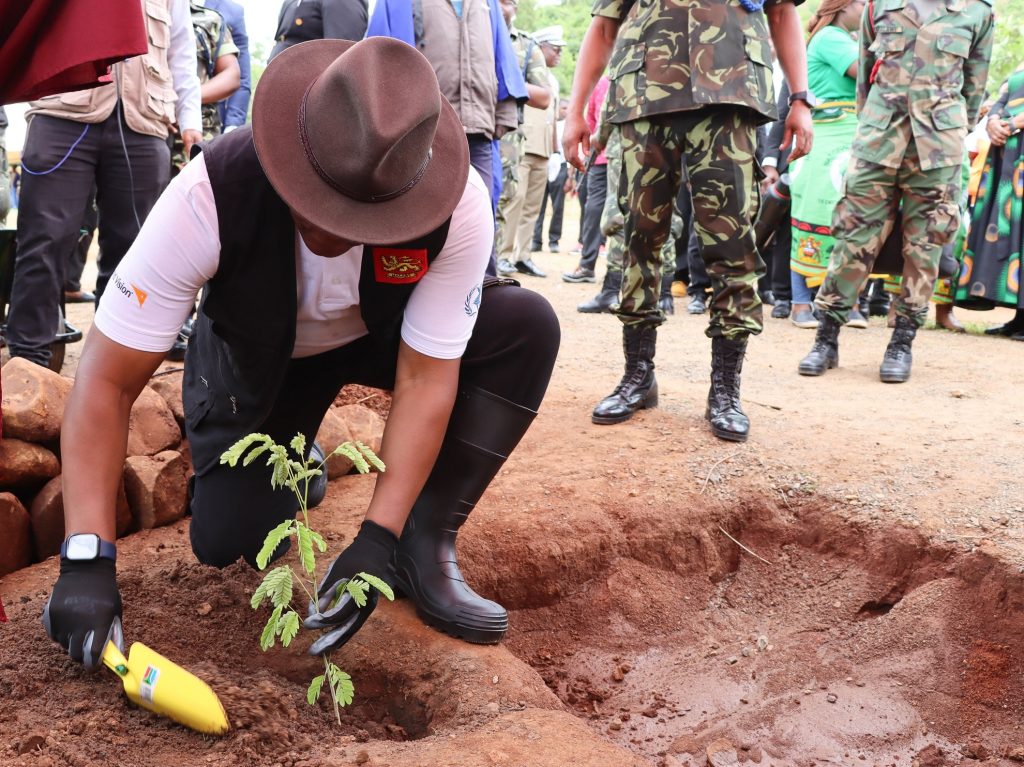Increased attempts to fight climate change through tree-planting
By Blessings Chiwaya
Findings of recent assessments show that forests in Malawi are under threat due to unsustainable exploitation, forest conversion for farming and logging among others.
For years, government, through the Ministry of Natural Resources and Climate Change, has championed the national tree planting exercise with a view to conserve the environment. The call to participate in the exercise has gone to private firms, companies, schools and non-governmental organisations as one way of fighting the impacts of climate change.
Two years ago, one of the impacts of climate change manifested itself in Tropical Cyclone Freddy. According to Relief Web, Malawi has been experiencing increased frequency, intensity, and magnitude of extreme weather events. Since 1980, more than 50 disasters associated with hydrometeorological events, including storms, floods, landslides, and droughts, have been reported in Malawi, affecting millions of people.

Under threat: Mulanje Cedar (Photo Credit: Internet)
Over twenty-five disasters associated with severe rainfall events (floods, landslides, and storms) have occurred in the last decade alone and have exhibited an incremental upward trend in terms of the number of people affected, says Relief Web.
“Tropical Cyclone Freddy hit Malawi as the country was facing one of the worst cholera outbreaks in recent history, as well as high food insecurity at the peak of the lean season. More than 50,000 cholera cases and 1,700 cholera deaths had been reported in Malawi prior to the cyclone, and even though a decline in cases had been observed, the situation is likely to worsen as result of the impacts of Tropical Cyclone Freddy,” according to Relief Web.
It says additionally, 3.8 million people were facing acute food insecurity—Integrated Food Security Phase Classification (IPC) Acute Food Insecurity (AFI) Phase 3: Crisis—at the peak of the hunger season and Tropical Cyclone Freddy has worsened the situation (Famine Early Warning Systems Network, 2023).
Taking heed of the call
In the process of preserving the environment, University of Malawi (Unima) Students’ Association under the Campaign for Female Education (Camfed) has started the project of planting trees in Zomba city, specifically in secondary schools, where they have managed to plant 100 trees at Zomba Urban and Police Secondary Schools.
One of the main aims of the students’ association is to cultivate a spirit of giving back to the communities they live in or interact with. These students want to be part of people are intent on saving the environment by giving hints and advice to communities on how they can conserve nature. That’s not all – the students also want to pay school fees for needy students in secondary schools.
Unima Camfed chairperson, Stevelia Steven says the association has resolved to take heed of the call to plant trees and care for the environment. She says the association has put in place charity initiatives which it plans to implement in Zomba meant to be beneficial to communities in the city.

Exemplary: President Lazarus Chakwera plants a tree (Photo Credit: Malawi Government)
“Camfed encourages us to give back to the communities. So, we promote girls’ education and help them with business initiatives. Today we have planted trees to encourage learners to take care of the environment and how to manage it,” Steven says.
In Mulanje and surrounding districts too, efforts are being made to conserve the environment. Mulanje Mountain Conservation Trust (MMCT), an environmental endowment trust is working in collaboration with Department of Forestry and other stakeholders in facilitating the raising of people’s awareness, involvement and understanding of the importance of the conservation and responsible management of the biodiversity and natural resources in the Mulanje Mountain Forest Reserve.
MMCT is encouraging the communities to plant trees in conserving the environment; it is helping communities from Phalombe in restoration of Mulanje cedar after noticing that the existence of cedar trees is dwindling due to deforestation. The organisation has been providing knowledge and improving horticultural methods for cedar restoration in the two districts.
Phalombe communities are taking part in the restoration as they intend to plant 36,000 seedlings over 27 hectares where the cedar trees once thrived to make sure that the environment is well conserved to avoid disasters.
Malawi as a country can reduce natural disasters by conserving the environment through planting trees on bare land and practicing re-afforestation in line with the UN Sustainable Development Goals (SDGs) – No 13 [Climate Action] – expected to be implemented successful by 2030 by all countries.

Logging is eating up forests (Photo Credit: Internet)
Concerned citizens from Balaka District who gave out their views on preservation of the environment, say poverty is the main factor that is fueling the cutting down of trees. They think that people cut down trees and burn charcoal to earn a living.
Innocent Semu of Chauluka Village, TA Nsamala in Balaka says population growth and pressures in Malawi are some of the factors that are pushing people to resort to cutting down trees in order to earn a living, use timber to build houses and a means to end poverty. He adds that this is the reason natural disasters strike and destroy gardens, homes and lives. He calls on people to embark on reforestation before things get out of hand.
“Here in Malawi, we are lucky that we have rivers and land that is bare. We can sensitize each other on the importance of planting trees and have many forests that will help to have sources of water that do not dry up. We have been hit by drought because forests are being destroyed at an alarming rate. Other areas in Malawi have started planting trees and these projects should be adopted by every district,” Semu says.
In addition to that Rose July from Dziwe in the same district, says there are other physical activities other than cutting down of trees which fuel climate change. She says these include uncontrolled mining and unsustainable use of rivers.
“Mining of rocks from rivers is not sustainable. People do it in the name of poverty but it is dangerous and wrong. it is one of the reasons rivers flood and destroy crops and property. We also need to stop gardening in river banks. Let us plant more trees and conserve the environment,” July says.
Malawi needs to take a direction that should lead to saving the environment. Failure to do that will have serious repercussions on agricultural production and the general livelihoods of the people.



